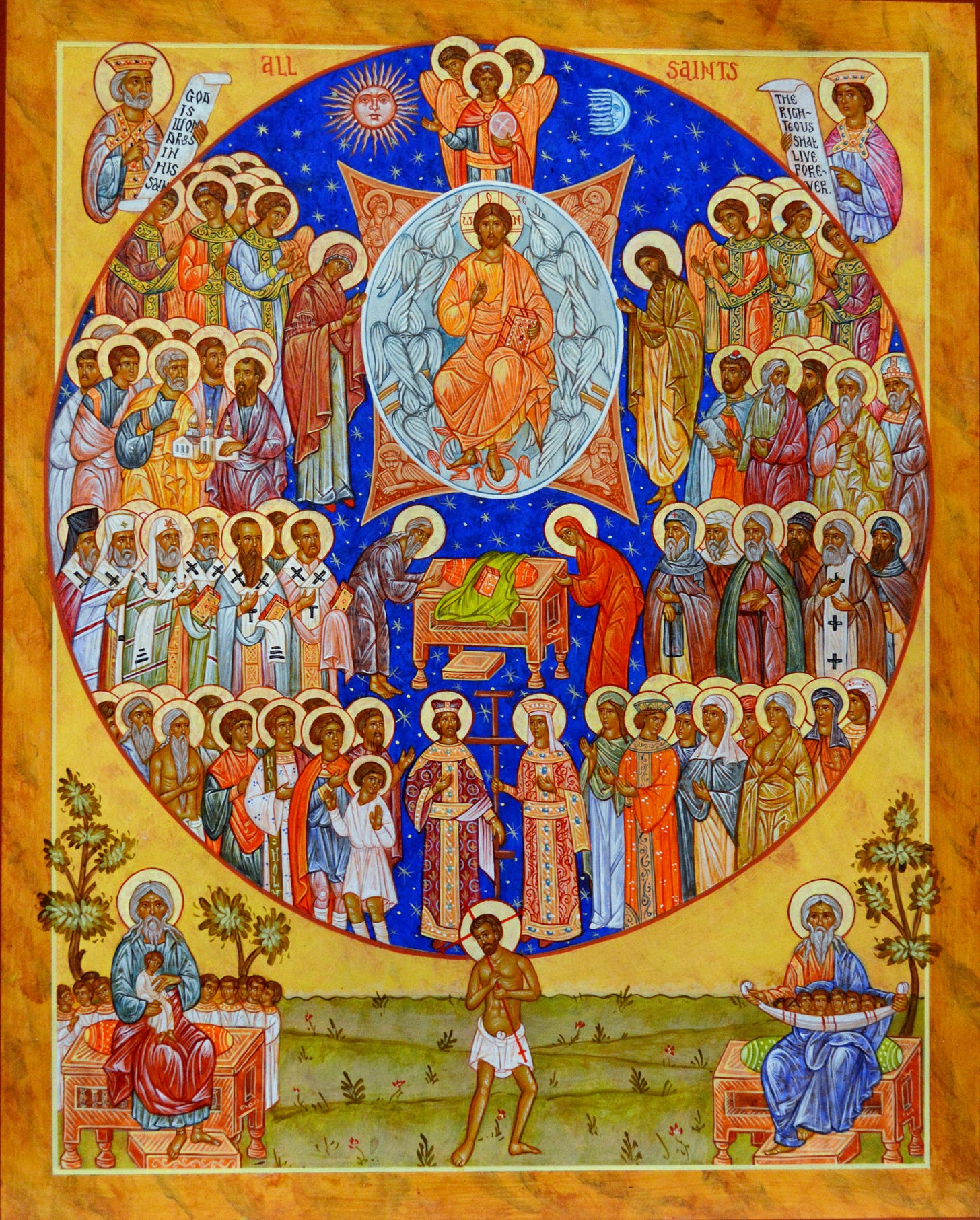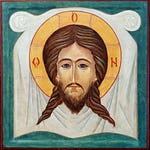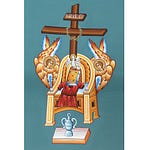Our understanding of the doctrine of the Saints comes from a single verse from S. Jude’s Epistle. He wrote of the importance of preserving the fullness of the faith, once delivered to the Saints. The Saints preserve the fullness of the faith. And so today we celebrate the Saints, for the Lord is glorious in His Saints.
That Saints are loved by the whole Church in all of its eras over time is obvious. Just look around at the Christian world: everywhere we see parish churches, cathedrals, monasteries, hospitals, fellowship groups, and more that have a Saint as their patron. Our church under the patronage of Saint Paul the Apostle; our cathedral in Orlando under the patronage of Saint Luke the Evangelist and Physician (also the patron of the Order of S. Luke, of which this parish has a chapter). The oldest parish church in the English-speaking world is in Canterbury, under the patronage of S. Martin of Tours (whose day on the Kalendar is this Saturday, 11 Nov.). York Minster in England is dedicated to S. Peter. Canterbury Cathedral in England has something of a patronage under S. Augustine of Canterbury, who led the re-evangelization of England in the 6th century. In the Vatican in Rome, of course, is the Basilica of S. Peter.
I could go on and on because the role of the Saints in the life of Christianity is undeniably important. We are surrounded by so great a cloud of witnesses, Saint Paul teaches. We are surrounded by them because they are our fellow-servants; we are one with all the Saints through Jesus Christ, all of us members of His Body, and members one with another. A person being named after a Saint remains a common practice, as well as knowing if one’s birthday falls on a Saints’ day on the liturgical kalendar.
S. Paul has more to say about the Saints in our Epistle reading today. He prays that God may give us a spirit of wisdom and revelation in the knowledge of Him (as the Saints have, he implies), having the eyes of our hearts enlightened (as the Saints have), that we may know what is the hope to which He has called us (which the Saints have), what are the riches of His glorious inheritance in the Saints, and what is the immeasurable greatness of His power in us who believe (which the Saints enjoy). The Saints are the primary examples we have about what it means for the power of the Holy Spirit to work immeasurable greatness in and through us.
They are the primary examples of what it means to love Jesus Christ. They are primary examples of what it means to be His disciple: meaning, examples of denying oneself, taking up one’s cross, and following Christ. The Saints are primary examples to us that all temptations brought before us by the Devil and our frailty can be overcome and rejected, having a heart right and steadfast, a heart that cleaves to Christ through life’s trials and turbulence. The Saints are the primary examples of what it means to make our ways straight (as S. John Baptist taught) and to have hope in Christ, to fear the Lord, trust in Him, and participate in Christ’s salvation in all times of consolation as well as all times of affliction and desolation.
It is sometimes taught that we can understand the Saints as “true friends.” We call a person a “true friend” when we have a living relationship with that person in which both people want the best for each other. The same goes for the Saints. We are truly participating in the Communion of the Saints, as the Apostles’ Creed has it, when the Saints are for us more than names attached to church and cathedrals, more than icons or stained glass images we see in holy places, when they are more than characters in the Gospel story. The Saints are truly for us a great cloud of witnesses that surround us – when we have a living relationship with the Saints, as we do with a true friend.
And to support this is a whole area of Christian literature known as Lives of the Saints, the catalog of reading which began to form very early in the life of the Church. From Saint Luke, in fact, we have the first efforts toward a life of a Saint in what Luke tells us about Saint Paul, and his journey from persecutor of Christians to pastor of Christians. While few if any of us have quite the dramatic story of Saint Paul in our coming to follow Christ as His disciple, many of us can find ourselves even in Paul’s story if we went through a period of our mature, adult life actively turned away from God, only to have repented and turned to Him, even to have some of Paul’s zeal.
And this is the case with the Saints in general: while the diversity of the Saints baffles analysis, we can always admire the lives of the Saints. Why? Because in simple terms: Saints are transparent to Christ. Saints are transparent to Christ in their thoughts, their actions, their feelings. Saints have put on the mind of Christ, in S. Paul’s phrase. And this is because they have allowed the Holy Spirit and His power to act in them: Saints teach us what happens when we cooperate with grace. Thought of in this way, there is so much to admire and imitate in the Saints: a true abundance.
For starters, we admire the Saints for their perseverance in the love of Christ and of the Holy Spirit working in and through them. We can imitate the Saint in their love of Christ, their commitment to Holy Scripture, their humility, their hunger and thirst for righteousness, for their ability to love their enemies (and pray for their enemies), and their teaching of Christian stewardship: of their generosity of time, talent, and treasure given to the Church. Saints exemplify what it means to be a “living sacrifice.”
Because of the incredible and inspiring witness the Saints offered in their own lives, the Church has always held up the Saints, that in recognizing our fellowship with them, our living communion with them through Christ, the Saints radiate and resonate God’s presence and power to us: the Holy Spirit Who filled them with grace and heavenly benediction flows from their witness and life to us. And hence, knowing that the Lord is glorious in His Saints; that the Saints are transparent to Christ; that the fullness of the faith is preserved in the Saints; and that they resonate the Holy Spirit to other members of Christ’s Body–with confidence in Christ our Saviour, we today ask the Holy Saints of the Church to pray for us, that we made be made worthy of the promises of Christ. Amen.











Share this post